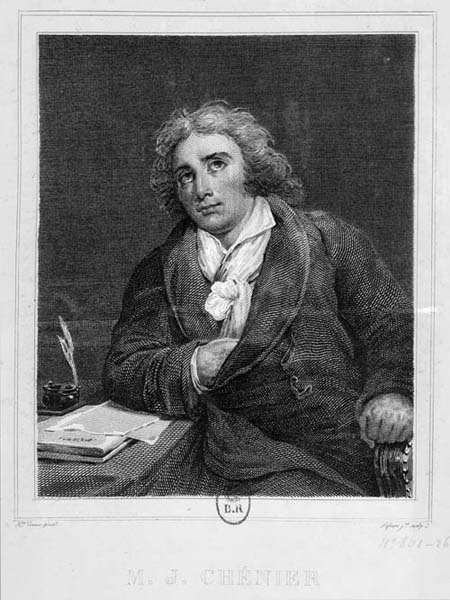Etienne-Nicolas Méhul.
Etienne-Nicolas Méhul is born the 22 June 1793 in Givet (Champagne Ardenne) and is dead tuberculosis the 18 October 1818 in Paris at the age of 54 years old. He is a french composer. His father was a hotelkeeper of Count of Montmorency.
At the death of the count, his father is then forced to become a wine merchant. This job which pay a little make his family poor. The parents of Etienne Nicolas Méhul are aware of his abilities but they can’t pay him lessons.
He studied music an organist of Givet. Thanks to his ability, at ten years, he was appointed organist of the convent of Recollelts in Givet.
In 1779, at 15 years old, he went to Paris through the exchange of a patron with a letter of recommendation for Gluck. He took lesson with Jean Frédéric Edelmann, himself a friend of Gluck, the idol of Méhul. He began his career as a composer by adapting the popular opera of Thesée de Gossec.
For the “Concert Spirituel” in 1782, he scores the music Odes Sacrées with the text of Jean Rousseau. During its twenty years (1783), Etienne-Nicolas Mehul published his first book of composing which contains three sonatas for pianoforte.
In 1786, he was admitted into Freemasonry at the lodge “Olympique de la Parfaite Estime” where he met many other musicians including Gossec and Philidor.
In 1788 he published his second book of composing: 3 Sonates pour Piano, op. 2.
At last he met Gluck who helps him and guides him to theater.
In 1790, he creates his first opera: Euphrosine.
The first performance was an immediate success. The following year, he presents Cora which is a failure and Adrian in 1792 too and will be censored for political reasons.
Stratonice (1792) and Méliodore and Phrosine (1794) are successful with on which his reputation is based. During the French Revolution, he wrote several patriotic songs and pieces of propaganda that Chant de depart (1794) with text by Marie-Joseph Chenier.
Thanks to his involvement, he enters to Institut de France (which includes l’Académie française , l’Académie des inscriptions et belles-lettres , l’Académie des sciences, l’Académie des sciences morales et politiques , l’Académie des Beaux-arts) in 1795.
It is the first musician to enter to the Institute. The same year he became inspector in Conservatoire de Paris where he teaches.
Then he produced Le Jeune Henri and Ariodant respectively in 1797 and 1799.
In 1804 he received the Legion of Honor, it is important as one of the first French to receive with Gretry and Gossec. In 1806, he created the Deux Aveugles de Tolède, and in 1807, Joseph. The same year he won the second Prix de Rome (scholarship for arts students). His opera The Amazon in 1811 was a severe failure, he stops his career as a composer and retired. He also leaves his duties at the Conservatory in 1816 and retired for six months in Hyères. On his return, he died of tuberculosis 18 October 1817.
Marie Joseph Chénier.
He was born in Constantinople, and spent his childhood in Carcassonne. He studied at the Collège de Navarre in Paris. He has an older brother of two years, Andre Chenier. In 1785 he joined the Comédie Française with a tragedy in two acts: Edgar ou le Page supposé. It is a failure. Similarly for the tragedy Azémire in 1786.
In 1788, he wrote the tragedy Charles IX ou l’école des rois who opposes tyranny and fanaticism. It is censored for two years and through two pamphlets sent by the piece receives approval for representation. The first was presented 4th November 1789 and is a success. This success continued in 1791 with Henry VIII and in 1792 Caius Gracchus.
He was elected deputy of the Seine-et-Oise to the Convention 15th September 1792 and keeps this position until 26th October 1795. It follows Fenelon (1793) and Timoleon (1794).
The same year he produced a number of revolutionary songs and hymns with the Chant du Depart.
He and his brother Andrew are enthusiastic about the Revolution but before the violence of the period, Andre Chenier decided to publish notice to the French people on its real enemies. This notice is the cause of his imprisonment in Saint-Lazare. He stayed there two days and was guillotined. Marie-Joseph was accused of not being able to prevent the death of his brother. For a long time, he doesn’t respond to the charge but in 1797 he decided to defend himself and he wrote the Epitre sur la calomnie. He was a member of Tribunat at the consulate, but is returned to the meeting.
After he became a general inspector of studies from Université. It offers his tragedy Cyrus that Napoleon doesn’t like. He resigned from his post. He gave many years of literature lessons that allowed him to live modestly. He died of a disease that had worsened.
Marie-Joseph Chénier.

Back to the french version :http://tpe-poetes-engages.wifeo.com/biographie-detienne-nicolas-mehul-et-de-marie-joseph-chenier.php
